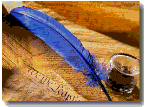
The Declaration of Independence
When in the course of human events . . .
The French & Indian War
1756-1763
(The Seven Years War)
The final Colonial War (1689-1763) was the French and Indian War, which is the name given to the American theater of a massive conflict involving Austria, England, France, Great Britain, Prussia, and Sweden called the Seven Years War. The conflict was played out in Europe, India, and North America. In Europe, Sweden , Austria, and France were allied to crush the rising power of Frederick the Great, King of Prussia. The English and the French battled for colonial domination in North America, the Caribbean, and in India. The English did ultimately come to dominate the colonial outposts, but at a cost so staggering that the resulting debt nearly destroyed the English government. It was that debt that caused the escalation of tensions leading to the Revolutionary War. Parliament was desperate to obtain two objectives; first, to tax the colonies to recover monies expended on the battle over North America, and second to restore the profitability of the East India Company in an effort to recover monies spent on the battle over India.
The French and Indian War, as it was referred to in the colonies, was the beginning of open hostilities between the colonies and Gr. Britain. England and France had been building toward a conflict in America since 1689. These efforts resulted in the remarkable growth of the colonies from a population of 250,000 in 1700, to 1.25 million in 1750. Britain required raw materials including copper, hemp, tar, and turpentine. They also required a great deal of money, and so they provided that all of these American products be shipped exclusively to England (the Navigation Acts). In an effort to raise revenue and simultaneously interfere with the French in the Caribbean, a 6 pence tax on each gallon of molasses was imposed in 1733 (the Molasses Act, see note: The Sugar Act). Enforcement of these regulations became difficult, so the English government established extensive customs services, and vice-admiralty courts empowered to identify, try, and convict suspected smugglers. These devices were exclusive of, and superior to, the colonial mechanisms of justice.
The colonies were wholly interested in overcoming the French in North America and appealed to the King for permission to raise armies and monies to defend themselves.* Despite sincere petitions from the royal governors, George II was suspicious of the intentions of the colonial governments and declined their offer. English officers in America were also widely contemptuous of colonials who volunteered for service. A few of the men who signed the Declaration had been members of volunteer militia who, as young men, had been dressed down and sent home when they applied for duty. Such an experience was not uncommon. It led communities throughout the colonies to question British authorities who would demand horses, feed, wagons, and quarters — but deny colonials the right to fight in defense of the Empire, a right which they considered central to their self-image as Englishmen.
Start page | The Document | Signers | Related Information | Jefferson's Account | Declaration House | Declaration Timeline | Rev. War Timeline | More Resources |





